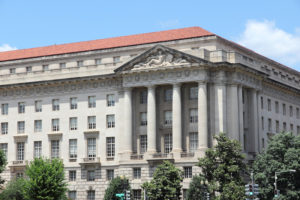
Attorney General announces gun control plan, judge prohibits suspicionless laptop searches at the border, and more…
IN THE NEWS
- U.S. Attorney General William Barr announced a U.S. Department of Justice plan to reduce gun violence. Known as Project Guardian, the plan seeks to reduce violence through coordinated prosecution of firearm crimes, enforcement of federal gun laws and background check requirements, better information sharing between local and state agencies about gun crime and gun permit screening, and a coordinated federal response to denials of gun permits on mental health grounds. Kris Brown, president of the Brady gun-control organization, said “the plan as outlined will not accomplish that goal, as it focuses only on enforcement and increased policing, making no serious effort to address the supply of guns and how they fall into the hands of individuals who have proven themselves a danger to themselves or to others.”
- A federal judge ruled that U.S. Customs and Border Protection (CBP) and U.S. Immigration and Customs Enforcement (ICE) must have reasonable suspicion to conduct searches of electronic devices. Judge Denise Casper of the U.S. District Court for the District of Massachusetts found that current CBP and ICE smartphone and laptop search policies “violate the Fourth Amendment to the extent that the policies do not require reasonable suspicion that the devices contain contraband.” Esha Bhandari of the ACLU, which filed the lawsuit with the Electronic Frontier Foundation on behalf of eleven travellers, said that “by putting an end to the government’s ability to conduct suspicionless fishing expeditions, the court reaffirms that the border is not a lawless place and that we don’t lose our privacy rights when we travel.”
- The U.S. Environmental Protection Agency intends to move ahead with a new rule that would limit the agency’s use of scientific research in regulatory decision-making. The rule—first proposed in 2018, but later reportedly delayed—would require scientists to disclose their raw data before the agency can rely on their scientific findings. As originally proposed, the rule only applied to toxicity studies, but a document published this week by The New York Times indicated that the agency will expand the rule to include all scientific research.
- The U.S. Department of Homeland Security (DHS) issued a proposed rule to extend the waiting period asylum-seekers face before being eligible to apply for a work permit. Seeking to “reduce incentives for aliens to file frivolous, fraudulent, or otherwise nonmeritorious asylum applications to obtain employment authorization,” the proposal would extend the waiting period from 150 days to one year, while also preventing asylees with prior criminal convictions of specific crimes from being eligible for work permits. Several major companies reportedly expressed concern to DHS that a longer waiting period would hurt their “ability to attract and retain talent.”
- The U.S. District Court for the District of Columbia dismissed President Donald J. Trump’s suit seeking an injunction to prevent his tax returns from being released to the New York Attorney General’s Office through the TRUST Act. The TRUST Act grants state officials the power to see government officials’ tax returns when requested by a congressional tax committee. New York Attorney General Letitia James said, “The TRUST Act is an important tool that will ensure accountability to millions of Americans who deserve to know the truth.”
- New York Governor Andrew Cuomo (D) signed into law the Restoration of Honor Act that allows gay servicemembers who were dishonorably discharged as a result of their sexual orientation to receive state benefits. “With this measure we are sending a message to LGBTQ veterans that we have their backs, just as they had ours,” said Governor Cuomo.
- The New York Department of Financial Services will investigate Apple Card for violating state sex discrimination laws. Apple Card’s algorithm came under scrutiny recently after David Heinemeier Hansson, a prominent software developer, tweeted that Apple Card gave him a credit line 20 times higher than his wife, Jamie Hansson, who had a better credit score. Goldman Sachs, the banking service for Apple Card, released a statement saying, “We have not and never will make decisions based on factors like gender.”
- Microsoft announced that it intends to “honor” the online privacy requirements of the California Consumer Privacy Act nationwide. “As digital technology becomes more and more essential in our day-to-day lives, the lack of action by the United States Congress to pass comprehensive privacy legislation continues to be a serious issue for people who are concerned about how their data is collected, used and shared,” said Julie Brill, the company’s chief privacy officer, in a blog post. U.S. Senator Richard Blumenthal (D-Conn.) said that “Microsoft is proving that tech companies can provide privacy protections to all Americans,” but added that “voluntary steps are no substitute for vigorous & enforceable rules.”
- The Dutch government cut speed limits in the country to 62 miles per hour in an attempt to reduce nitrogen emissions. Prime Minister Mark Rutte reportedly originally proposed to raise speed limits, but reversed course after the Supreme Court of the Netherlands found that his government’s policies violated European Union’s environmental laws. Rutte reportedly called the measure “a rotten step to take” but said it was necessary “to make sure the Netherlands doesn’t get locked down and to prevent jobs from being lost unnecessarily.”
WHAT WE’RE READING THIS WEEK
- In their recent work, Professors Brian F. Mannix and Bridget C.E. Dooling of the George Washington University Regulatory Studies Center offered two pathways for a court to enforce executive orders requiring agencies conduct a cost-benefit analysis. First, Mannix and Dooling argued that courts could apply the Administrative Procedure Act to say that agencies have a duty to conduct a cost-benefit analysis in their decision-making so as not to be “arbitrary.” Second, they noted, courts could create a common-law requirement for cost-benefit analysis when regulating.
- In an essay for Notice and Comment, Professor Zachary Price of the University of California, Hastings College of the Law cautioned that a Trump Administration loss in Department of Homeland Security v. Regents of the University of California—the upcoming U.S. Supreme Court case addressing President Trump’s decision to end the Obama Administration’s Deferred Action for Childhood Arrivals program—would have negative implications for regulation. Because of the broad deference courts owe to agency decisions, Price argued, the Trump Administration’s decision to end the program and begin enforcing immigration laws against undocumented migrants should be presumptively valid. Furthermore, a loss for the Trump Administration would “give other regulated parties a potent cudgel for beating back future pro-regulatory policy changes,” by creating a presumption that future Presidents cannot decide to enforce laws that their predecessors refused to enforce, Price wrote.
- Azza Altiraifi of the Center for American Progress issued an update of her 2015 brief on disabled Americans’ economic security. Outdated or inadequate law and regulation continues to present a structural barrier to economic autonomy, Altiraifi argued. Development of programs to increase access to housing and transportation, an increase to the federal minimum wage, and a revision to current tax credit schemes, Altiraifi concluded, would assist disabled Americans in breaking the poverty cycle.
FLASHBACK FRIDAY
- In a 2011 essay for The Regulatory Review, Professor and Vice Provost Anita Allen of the University of Pennsylvania Law School argued that governments should protect the right to privacy—even when it is unpopular. Although many privacy laws enjoy popular support, some paternalistic privacy laws seek to shape people’s behavior against their will, Hill wrote. Although Hill acknowledged the risk of government coercion inherent in such policies, she argued that unpopular privacy protections can still be justified because privacy is a fundamental human right “that make us better equipped for life in a free society.”



